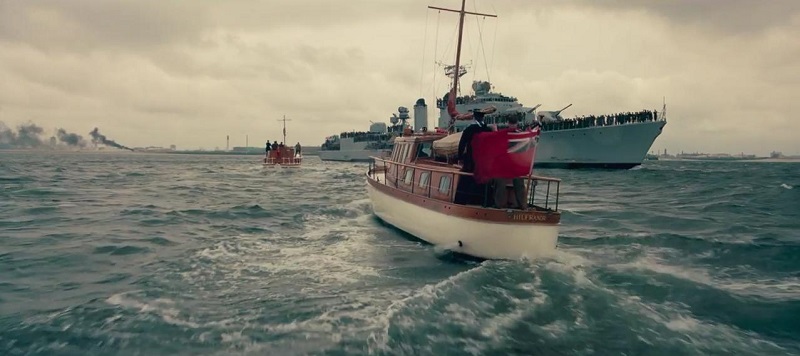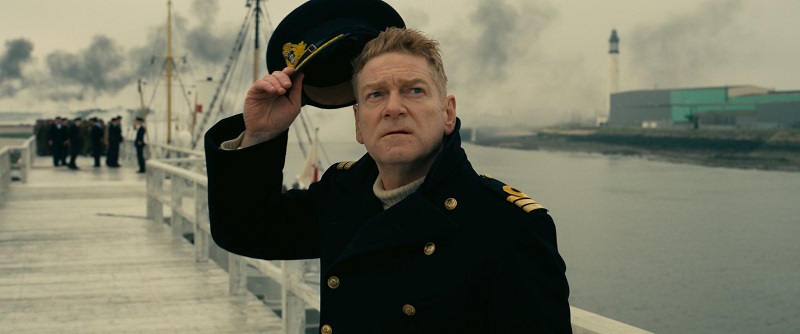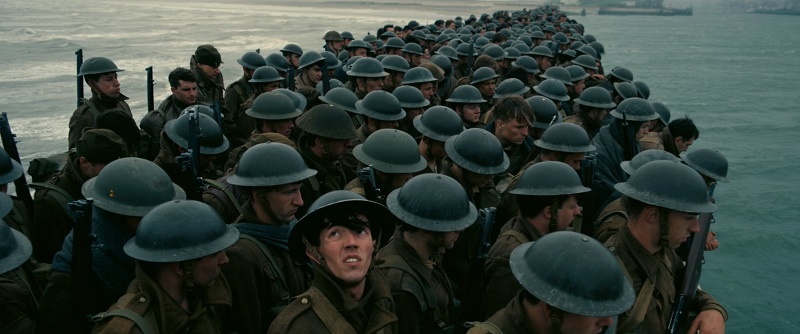For the British people during World War II, they needed something to rally behind as the battle against the Germans was not going well. That rallying call came in from of the most surprising of places, a combination of everyday Britons and 400,000 soldiers stranded on a stretch of French beach called Dunkirk. Christopher Nolan has crafted an epic film with Dunkirk that serves as both a love letter to bravery and historical chronicle of one of the great moments of British history when country and those sent to defend her came together as one and showed that with the full support of the people and military, evil did not stand a chance.
The pacing if Dunkirk is suspenseful to the ninth degree. It begins with the soldiers already trapped by German forces on all sides — by land, by sea and by air. No need to tell us how they got there, it doesn’t matter. What is important is how these soldiers are going to get off the beach. As Mr. Dawson (Mark Rylance) readies his boat and the two young men who are with him to head to the front lines to rescue as many men as they can, we have got our composite of the force from home to heed the call to serve and save.
It is crystal clear that these “average folks” know they are heading into the firefight. They are hardly equipped with few, if any, weapons. Each one of these homegrown sailors simply knows that their countrymen are in harms way and there is little the military leaders can do about it at this moment. It is a rich metaphor for a time not so long ago when such virtues were celebrated. We’d like to think if this were to play out in modern times — the ending would be the same. But, that is not guaranteed.
What we witness in terms of bravery is stunning and it comes from all involved, the soldiers on the beach, the military men in charge of getting them off the beach, as well as the citizen seamen who are heading into harm’s way performing the ultimate selfless act. Kenneth Branagh’s Commander Bolton is doing his best to ensure that his charges know that all hope is not lost, even if it appears it is. Heck, even a Red Cross boat is attacked trying to evacuate soldiers at Dunkirk. There is no mercy. Yet, Bolton must convey a sense of believability that help is coming, even though deep inside, he has no idea what form that will take.
The soldiers on the ground take the form of a massive ensemble (led by Fionn Whitehead, Aneurin Barnard and Harry Styles). They embody the pawns in this power play impeccably and show that they are as determined to survive as they are to win the larger war itself. It is that surviving resolve that proves to provide the sense of victory for all those involved. Sure, they didn’t win the Battle of France on that day, but even making it out of Dunkirk alive against all odds is seen as a victory. That aspect will indeed charge up the souls at home and the military that is set to face its greatest challenge yet, D-Day and all that comes after.
There is suspense in the movies, and there is the one long drawn out suspenseful sequence that is Dunkirk. How Nolan maintains that level of intensity is awe-inspiring. From the moment the film commences until its conclusion, prepare to have senses elevated and involuntary movement abound as Nolan sucks you into his world and only amps up the stakes as the minutes tick by.
Adding to that white knuckle cinematic experience is the score of Hans Zimmer. What he does with a few simple notes and percussion is enough to make your heart want to pop out of your chest. His work not only enhances the tension, but it elevates it simultaneously. It’s an uncanny marriage of movie and music that certainly deserves Oscar’s attention come nomination time. It is one of his best, yet not necessarily the most elaborate, scores to date. But it fits the Nolan narrative in a way that is for lack of a better phrase, pitch perfect.
Zimmer’s score is also just one element in this bounty of brilliance. The way that Nolan captures his story using IMAX and film cameras gives us a feel that is authentic. In his continuing effort to “save” film,” Dunkirk’s greatest accomplishment might be that it serves as a film that must be seen on the largest film screens possible.
As much of the movie ingesting world goes smaller and smaller, Nolan reminds us why audiences need to put down their phones, tablets and TVs and make a pilgrimage to the theater and witness a film experience as it was meant to be seen. Dunkirk has the most sensational of scope, is the most epic of movie-going experiences and that is just its pluses on the sensory side. The emotional pull is priceless. Despite little in terms of exposition and backstory, each one of these characters is richly presented in a way that paints them all as heroes. Every. Single. One.
Dunkirk: A+



